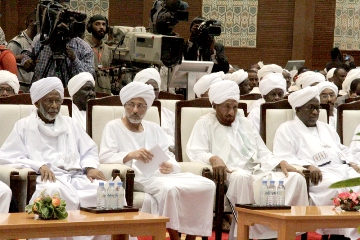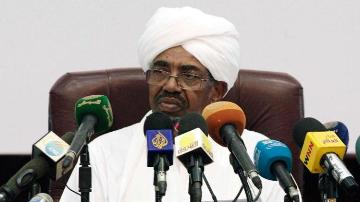Sudan’s Bashir disappoints after speech brings no specific reform agenda
January 27 , 2014 (KHARTOUM) – The long awaited speech by the Sudanese president Omer al-Bashir on Monday night that was expected to unveil a major reform proposal, created a wave of disappointment among those who followed it including opposition leaders who were present.

But they also dismissed rampant speculations about Bashir’s intention to resign or delegate his powers to his recently appointed 1st Vice President Bakri Hassan Saleh.
They also ruled out the formation of a new inclusive government that brings on board major opposition parties in order to work on drafting a new constitution and prepare for elections.
The attendance of top opposition figures including former prime minister and head of the National Umma Party (NUP) al-Sadiq al-Mahdi, leader of the Popular Congress Party (PCP) Hassan al-Turabi and recently defected NCP figure who formed the Reform Now Party (RNP) Ghazi Salah al-Deen al-Attabani raised expectations of an imminent reconciliation between the NCP and its foes.
The NCP also invited diplomats and media representatives to the event which was held at the Chinese-built Friendship hall in Khartoum.
In his address which went on for almost an hour, Bashir said that the NCP is determined to take the lead to prepare the Sudanese for the “leap “towards national reconciliation and expressed readiness for dialogue with all sides of the political spectrum including rebel groups through he stressed that the latter must first renounce violence.
Bashir argued that the challenge facing the political forces is their ability to give precedence to national loyalty over “narrow” party loyalty and also called for political competition for Sudan and not against the NCP.
As an example the Sudanese president noted that the NCP in its quest for peace signed the 2005 Comprehensive Peace Agreement (CPA) and Darfur peace accords of 2006 & 2011.
Bashir went on to say that the NCP recognizes that more reform is required to advance the political agenda of liberalization of political work that would expand the scope of participation.
He emphasized that economic development will not be possible without establishing peace. In that respect he announced the establishment of an economic planning agency as part of the finance ministry, strengthening the role of the central bank, forming a national council for revenues and revising the formula for splitting federal resources.
The Sudanese leader also underscored the importance of developing indicators and general guidelines for economic renaissance that aims to fight poverty through upgrading the workforce competitiveness, providing cheap energy and focusing on the production of food crops.
OPPOSITION NOT IMPRESSED
The PCP’s chief al-Turabi told reporters afterwards that the president’s speech brought “nothing new” and lacked diagnosis of the problems facing Sudan and presented no fundamental solutions. He noted that Bashir spoke in very general terms in a slogan-filled language without any specifics that people can relate to.

Turabi stressed that dialogue is the only way to resolve the political crises of Sudan adding that the PCP is willing to engage in dialogue without preconditions.
Al-Attabani who was expelled from the NCP late last year, said that Bashir spoke in abstract terms at a time when people expected more clarity.
Nonetheless the former presidential adviser said that there is still a chance if Bashir’s speech was presented as a preliminary roadmap that could form the basis for dialogue adding that he is assuming goodwill on the part of the ruling party.
Al-Mahdi refused to comment saying that his party will review the address first before issuing a formal response.
The NCP’s political secretary and the country’s investment minister Mustafa Osman Ismail sought to explain the lack of concrete proposals by saying that Bashir initially wanted to make the speech after first meeting with leaders of political parties.
But as a result of intense speculations, Ismail said that Bashir was forced to address the nation earlier than he wanted to.
He said that al-Bashir will meet with NUP leader al-Mahdi after returning from the African Union (AU) summit in Addis Ababa later this month.
In an indication of confusion within the ruling party, Rabie Abdel-Aati a senior NCP figure earlier told Reuters that Bashir would use the live television address to call for opposition groups to help redraw the constitution and join the government.
But while Bashir did say political parties should join dialogue on the constitution, he did not go further.
The veteran Sudanese leader who took power in an Islamist-backed military coup 25 years ago also gave no indication of his position on running for presidency in the 2015 elections.
Last year, Bashir reiterated his intention to step down at the end of his term next year and said that Sudan is in need of “fresh blood”. But later he hinted that he could run again for president, saying that his re-election will be determined by the NCP’s General Convention and the Shura Council.
In 2009 he became the first sitting head of state to be served with an arrest warrant from the ICC for war crimes and crimes against humanity allegedly committed in the Darfur conflict, which according to the UN, led to the death of 300,000 people and displacement of 2.7 million in 2003-2004.
Last month he conducted a cabinet shakeup which saw the departure of several longtime NCP figures including ex-VP Ali Osman Taha.
(ST)
